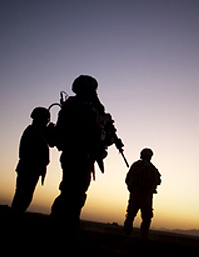Memorial Day: Remembering Those Lost, Well After Action
 On a Saturday night last November, Joe, a good friend of my father-in-law, celebrated his 62nd birthday. His wife made his favorite dish, spaghetti with boneless ribs, served in a giant kettle. There was a German chocolate cake, people brought presents. He had friends, children and grandchildren with him.
On a Saturday night last November, Joe, a good friend of my father-in-law, celebrated his 62nd birthday. His wife made his favorite dish, spaghetti with boneless ribs, served in a giant kettle. There was a German chocolate cake, people brought presents. He had friends, children and grandchildren with him.
The next night Joe drove to a nearby park, walked into the woods, and shot himself to death.
My father-in-law Dennis was, until he retired, the Veterans Service Officer for Tulare County, California. A Navy vet, Dennis served as a bosun’s mate on the USS Oklahoma City in Vietnam. Joe, was a veteran as well, of the Army. The two met through the local chapter of the Vietnam Veterans of America and became good friends. Dennis was the first person Joe’s wife called when the police found the abandoned truck the night he killed himself. As Dennis was telling her that he would help in the search, as he was putting on his sneakers, the line went dead. Searching was unnecessary; the police had found Joe’s body.
Joe suffered from post-traumatic stress disorder, compounded in the years before his death by a bad motorcycle accident which left him with chronic severe back pain. He came back from Vietnam and married, worked as a mechanic, but the war stayed close. At his birthday party, he asked if a box he’d been given as a gift could hold bullets. On a seat in the truck he parked in the lot the night he died, Joe left a copy of his Army discharge papers.
It’s impossible for me, sitting at such enormous distance from the war in Vietnam, to understand the impact it had on those involved. Memorial Day is intended to be an opportunity for us to remember those who gave their lives to defend America and protect our values, but the image we have of gallant young men lying facedown in the Norman surf is not a complete portrait of those who died for our country. Joe gave his – ultimately because of the trauma he suffered in the war, but immediately on the day he joined the Army. He didn’t die in Vietnam – he still lived a good life, raised a family – but the war killed him. Joe’s service altered the scope of the rest of his life.
Every day, young people are returning from Iraq and Afghanistan having made the exact same sacrifice. It’s something of a shorthand at this point to mention with sadness those who’ve killed themselves on returning, that the military’s infrastructure for dealing with them once they rejoin us is insufficient. We neglect those who have been shut down by the things they’ve seen and done – the ones who share Joe’s strength and manage to bear the enormous pain of lives painted with tragedy for decades before they succumb. Managing their return should be the first step. Managing the struggles of the rest of their lives takes infinitely more effort. Even when a veteran is the best friend of a man who has dedicated his career to serving veterans, there’s only so much that can be done.
I’ve only ever met one veteran of Iraq – my wife’s cousin, Dustin. We met in 2007 at a wedding, where he told stories of his time as an artilleryman, the precision with which they could map out small parcels of land for obliteration. That was about as much detail as he went into, and those of us listening certainly didn’t push for more. You got a clear sense of remoteness: remoteness of distant targets that transitioned from threats to puffs of dirt, the remoteness of Dustin as he flatly told the story. He was about 27 then, and there wasn’t much else for he and I to talk about.
Last month, Dustin was found dead of a heroin overdose in a Southern California laundromat. In a sense, I didn’t meet Dustin – just the young man who came back from something so jarring that he wouldn’t talk about it and we couldn’t hear it.
Today, I remember Joe and Dustin, men I met but didn’t know. I keep in my thoughts those whose lives ended on the field of battle and those who will give theirs here at home. The military is thoughtful and deliberate about how it prepares its soldiers for battle and about ensuring that all who serve receive a proper burial. In a war, that system works. But for those who survive, it can be the forty intervening years between conflict and death that are the biggest struggle.
For more information on how you can help those returning from war, visit Iraq and Afghanistan Veterans of America.
Photo By Emilio Morenatti, AP, via AOL News.
This is an opinion piece. The views expressed in this article are those of just the author.
New: The Mediaite One-Sheet "Newsletter of Newsletters"
Your daily summary and analysis of what the many, many media newsletters are saying and reporting. Subscribe now!






Comments
↓ Scroll down for comments ↓